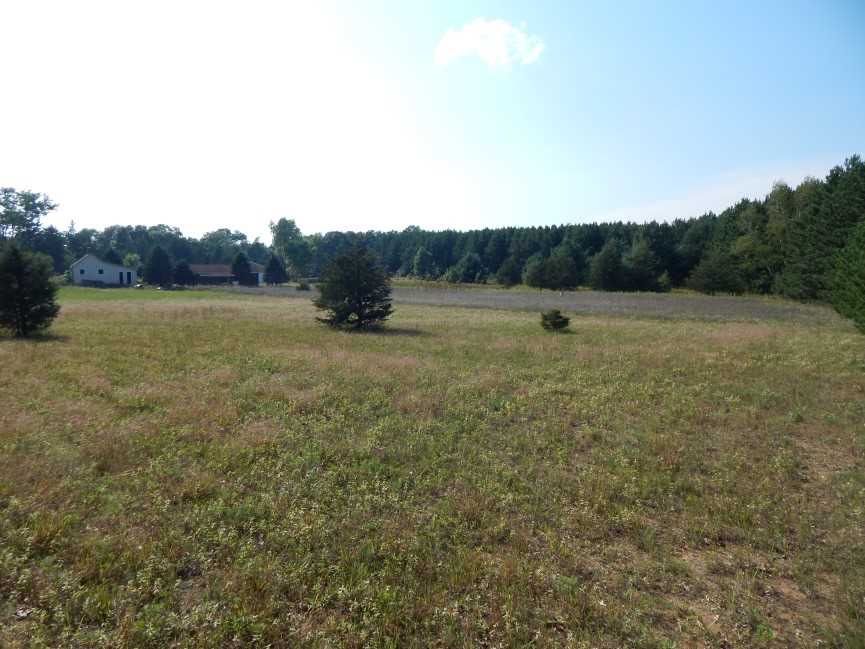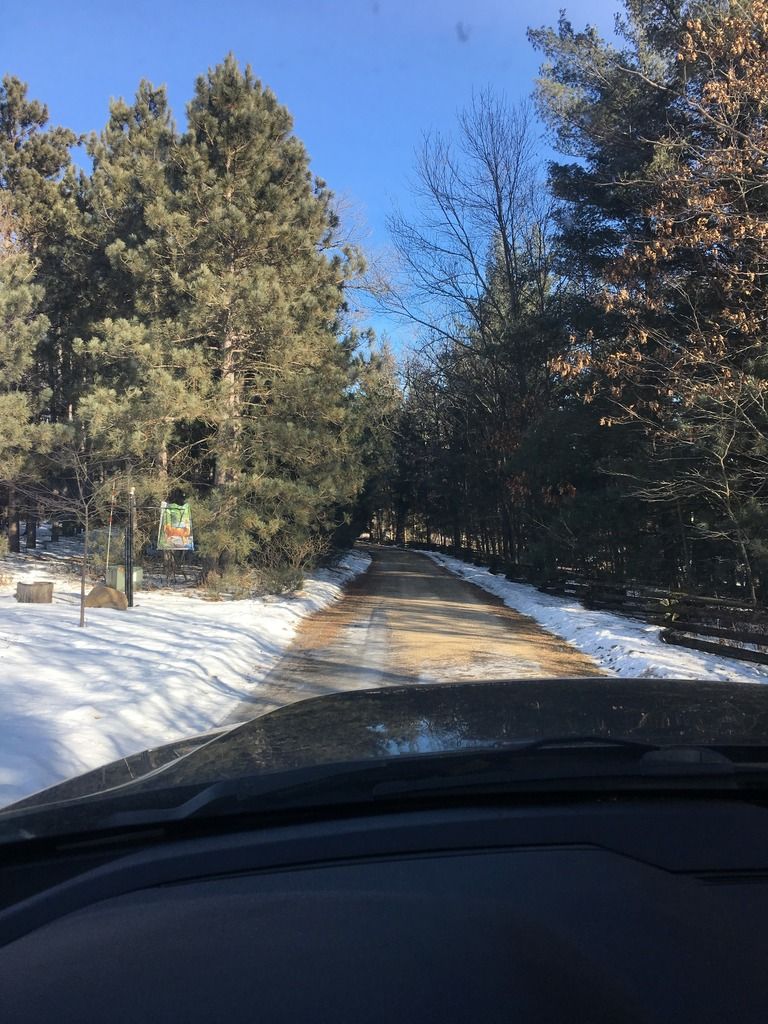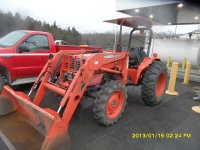if you have tillable land. (farm field areas), higher it out / contract it out to local farmer in the area. larger machines / specialized machines are field working machines. you need more of a do it all maintenance of property machine.
own 77ish acres in illinois here.
skidsteers = too slow MPH. not worth it. they are maneuverable and good for tight spaces. but long runs, side to side of property and like just to slow.
telehandlers = could be nice. not specifically a tractor, but a lot of stuff can attach to them. only issue is 3pt hitch. some have 3pt hitch.
Versatile Tractors,Compact Tractors,Trailer Packages,Landscaping,Utility Vehicle Rentals,Mowers-Power Trac = everything attaches to the front. think combo between skidsteer and tractor. sells most stuff you could want for general maintenance of property.
suggest min of 2 tractors. 1 dedicated for mowing the lawn (small riding mower or like), and then 1 larger tractor for everything else.
4x4 / MFWD or like setups, would be recommended. to deal with snow / mud issues and keeping traction.
FEL (front end loader) of course. for bucket out in front. general duty bucket (NO light weight mulch bucket)
-- get some hooks weld or bolt on, for the bucket, across the top of it. (makes life easier in long run chaining stuff to bucket)
3pt hitch. TNT (top N tilt) replaces top link and side link (large screws to adjust 3pt hitch) with hydrualic cylinders. it is a costly little option, but makes road work and dirt work with grader/scrapers, back blades, box blades much easier to use, and adjust on fly to deal with ditches, curvature of road both around curves, but keeping a high spot in middle and lower edge sides of road. so water drains off of road.
you will need the extra check chains, sway bar/chains for 3pt hitch. rotatory cutters (bush hog many folks call), and some other 3pt hitch stuff will need the extra chains / bars so you do not damage the 3pt hitch and its linkages.
Tractor Attachments And Skid Steer Attachments For Any Tractor Or Skid Steer = a good spot to look at all the attachments for tractors. along with text and videos of use and adjustments.
snow blower for tractor are costly little items. you do not need them. and can be bought generally later in the future. if you want a grapler for FEL or snow blower that fits on FEL. you generally need a joystick with 3rd option button to operate grappler / snow blower.
get a min of 2 rear hydraulic ports on tractor, if you get TNT for 3pt hitch, then suggest min of 3 hydraulic rear ports.
if you be expecting to use a 12v electrical cable winch on tractor. double check to see if there is a larger alternator option for tractor. so you do not drain battery. cab tractors generally have larger alternator already installed.
backhoes are costly items, if you want a backhoe, get it with the tractor at same time on same reciept. you are more likely to get a bigger discount. and save on labor, when extra connections / valves / frame work is added to attach backhoe ((backhoes with subframes highly suggest if not required)) make sure it is a 3pt hitch backhoe that comes off, and you get access to 3pt hitch, some tractors backhoes do not come off. if you do get backhoe, make sure you get the extra links, sway bars, chains. so when you want to use 3pt hitch you have all the pieces there.
some folks, just save up jobs, and rent a mini ex (mini excavator) for a weekend warrior project, and hit multiple things in one go. myself not sure if i could give up not having backhoe. tree stumps, ditches, loading / unloading stuff from truck, some dirt work, etc.... again backhoe is costly item. determine your needs.
a cab is suggested, just because of the bloody wind chill in coldest of mornings, and night times. trying to clear the driveway. they are more expensive. but just having wind protection. even without a heater or a/c it makes life worth while. some sun shades and DIY and alternative soft cabs are out there.
tires, would most likely suggest R1 tires over industrial tires. R1 = large pizza cutter tires with knobs on them. industrial tires, are fat tires, and may not have much traction on snow/mud. there is con's and pro's to each. but if you need to drive over yard when it is wet then wait till it drys up a bit more to run R1 tires across it.
filled rear tires (liquid in tires) would be suggested. if lot of dirt work is planned. it may not be an option if backhoe is put on. some recommend industrial tires when backhoe is put on.
chains for rear tires might be suggest for snow.
split left and rear brakes (you can move a lever on brakes pedals to act as a single pedal, and then undo lever, so one pedal operates left rear tire, and another to operate right rear tire break). smaller tractors less likely to have feature. larger tractors more likely have it. ((for me it is a requirement, no if's, and's, or but's)) to many times front wheels simply not touching ground when using FEL, to not enough weight on front tires, to pulling something behind tractor and front tires not having enough grip. and the split rear brakes come in handy real quick. not to mention getting yourself unstuck in some mud. preference is making sure one foot operates brakes, and other foot operates gas pedal / HST forward/back pedal
transmission types, stay away from manual transmissions, they have there place, but you are more likely better off with a HST or other hydraulic like transmissions. and some gear ranges you can select. it is the being able to adjust the correct MPH, and inching forward slowly pending on task that HST shines. and a do it all tractor, you will have a lot of forward / backward driving. and sudden switching between forward / backwards motions (drive maintenance / snow) some tractors have a lever beside steering wheel. (kinda like a turn single lever), but you push it backwards/forward to change direction. vs using a HST forward/backward gas pedal.
if you have an option. get upper forward and rear lights, mounted on roll bar. (cab should auto come with high upper lights on front and back of it). during winter and getting home and sun has set. you will most likely need the lights. getting home any time of year, and trying to do the last bit of work right up to sun set. the lights come in handy. when ya hauling stuff back to the shed. and needing to unhook stuff and put it away for the night.
one other thing. get a cold starter / warmer package kit for tractor. newer tractors tend to have a glow plug in intake manifold, and if you hold key in a certain position the glow plug will be used (some times it is all automatically done), also get a engine block heater, that has a 110v plug, you connect to with extension cord. while new tractors doubtful to have an issue starting. it is the single digit and below Fahrenheit temps. and waking up in morning trying to get things going. cold batteries = less likely to crank engine over.
most of everything above is tractor itself. if buying new, even if buy used. get the options all together. or you end up paying some expensive trailer fees, and labor costs. if adding each one separately down the road.
3pt hitch equipment can all be had later on. and through different dealers / sellers. it is all interchangeable. exception of backhoe which is more tractor specific (see above).
some times more horse power with least amount of options is better option, and other times is is getting less horse power with all the little extra options that makes life easier. when trying to fit tractor into budget.
smaller tractors can do it all, just takes longer, but when it comes to pulling and lifting, then it is all horse power and rated lifting / pulling capacity of the tractor.
guessing 20hp power diesel tractor to low on HP, guessing 30HP to 40 HP range, gets you into bigger frame work with more an agriculture style frame work of a tractor. vs what looks like a oversize riding lawn mower. the AG framework tends to have a higher clearance between ground and underbelly of tractor, nice for snow/mud and getting through it. and you generally get the additional extras for overall controlling the machine (split brakes, other gear ranges to select, more pulling and lifting capacity)
50 to 80 hp range. and you are just paying for horse power and larger tractor. which you may or may not need. some folks due need more, due to dealing with livestock, and/or farm field work. a couple acre garden. is still a garden.
local dealers most likely will not allow you to dig with FEL and do other stuff to tractor. due to tractor being brand new and a test drive could scratch up the paint. and may only get to drive it around press the brakes. raise the front tires off ground with FEL.
TractorHouse.com | Used Tractors For Sale: John Deere, Case IH, New Holland, Kubota. used and new tractors, mostly geared to agiruclture for all the equipment listings. but tractors are same just different stuff attached to them to do different things. you might see if a local used tractor or 2 are near you, and test drive / use to see the power and like.
MachineryTrader.com | Backhoes for sale, skid steers, excavators, dozers. = sister sight of tractorhouse. and more for industrial equipment (what local towns / cities / folks in business might use) TLB (tractor loader backhoes = these backhoes normally do not come off for access for 3pt hitch. you will want access to 3pt hitch). telehandlers and other equipment.
craigslist: chicago jobs, apartments, personals, for sale, services, community, and events = searchtempest or other website to search multiple local cities at one time. tend to offer a lot of 3pt hitch and like attachments used, some tractors due show up.
if you are not mechanically inclined. suggest staying away from used tractors. if you are DIY'er / mechanically inclined, buy the shop manual for tractor, so you have the stuff to diagnose and figure out problem and how to tear it apart and put it back together right there.
buying used, tractorhouse was nice for me. found some tractors, loaded up address into GPS. and took a day and went looking at them all. same day. (ugly long drive)
the rubber on tires that is left, and/or if in bad condition can be an issue (tractor tires are expensive, 1,000 plus dollars pending on size), hydraulics (FEL / 3pt hitch), start up tractor let it warm up and test drive it. then raise FEL up off ground, shut tractor off and see how long it takes to drop, if it drops in a few minutes a little bit hydraulic cylinders to valves may need to be repaired. i would rather by a greased up dirty looking machine, were i can see leaks, and grease spots here and there, and overall maintenance done. vs a machine cleaned and freshly painted. check brakes on unit both left and right, and emergency brake. brakes are not at the wheel like on trucks / cars. be internal, and can be labor intensive to repair. check the gear ranges both forward and backwards, then recheck under a load. pulling something, or using FEL to dig into something. make sure tractor is warmed up first. cold tractor may not show issues as noticeable of slipping and like. check out person garage, to see if they even have grease guns, and filter tools, and like. to see if filters are more likely replaced, and preventive maintenance was done on unit. (greasing and like)
make sure you go try out a dozen tractors from different folks. some of it is high dollar crud. others are low used, low price. some are leaving a drip trail of oil behind them. some of them are loose as a goose, (joints in the FEL), to backhoe joints loose. loose being, you let go of joystick, but takes a few more inches or more for stuff to stop moving.
there be websites like uship and like websites to get access to someone to pickup and deliver tractor.
new tractors, it can be more of who is a local dealer for warranty issues and maintenance. the cost of trailing tractor to and from your home most likely not covered and you pay for the travel cost.
simply finding a local dealer for getting parts / service is a huge plus.
















